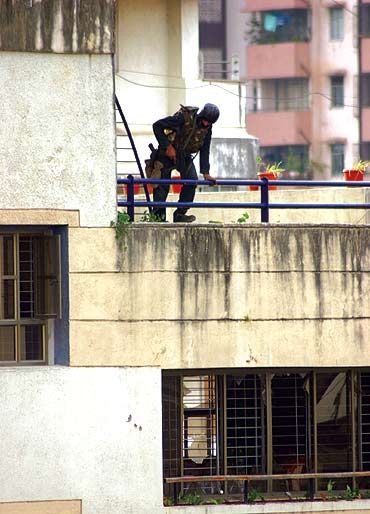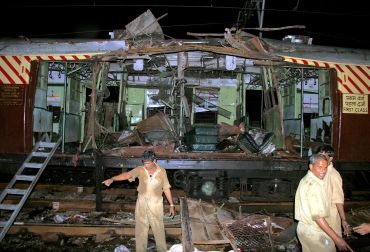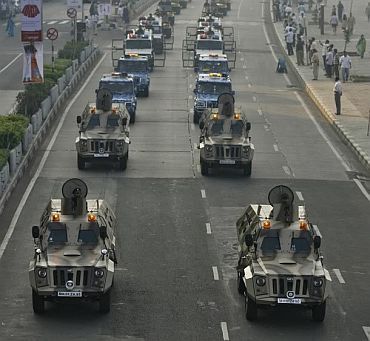 'Pakistan is convinced that the Modi government has -- given its image and political compulsions -- no choice but to act in the case of another terror attack,' says Colonel Anil A Athale (retd).
'Pakistan is convinced that the Modi government has -- given its image and political compulsions -- no choice but to act in the case of another terror attack,' says Colonel Anil A Athale (retd).
It seems we have learnt very little from the 26/11 attacks.
Surely, the Mumbai police have got some fancy gear/weapons; the National Security Guard has a rapid reaction unit located in Mumbai and some other locations besides New Delhi, and the maritime police have got better boats.
In some fundamental ways, the situation has not changed in many aspects of counter-terror preparedness or prevention of its recurrence.
The biggest weakness in the Indian policy of dealing with the threat of terrorism is its excessive emphasis on anti-terror measures at the cost of neglect of a counter-terror strategy.
Anti-terror operations are confined to installing CCTV cameras, formation of the National Investigation Agency to probe terror attacks and increased deployment of rapid reaction forces.
All these are passive measures and presuppose that terrorist incidents will take place. This approach is more like doctors learning from the post-mortem of patients.
Many Indian strategic analysts label the above anti-terror measures as a 'deterrent' against future terror attacks. They are plain wrong. First and foremost, a suicide terror attack cannot be deterred/stopped by elaborate CCTV coverage, unless we have the ability to detect a terrorist in real time and take action to neutralise him/her before the act.
But most fundamentally, the terror training in the neighbouring country, the hate propaganda and planning for terror attacks against India continues unabated. Also, local domestic sleeper cells continue to function and are ready to spring to action when needed.
If we have to prevent future terror attacks then these activities have to be stopped. What we are looking at is thus not deterrence, but 'compliance.'
Thomas C Schellings in Strategy of Conflict (Harvard University Press, 1981) has analysed the role of compelling threats and 'brinkmanship.' There is a clear distinction between a threat intended to make an adversary, Pakistan, do something (or stop doing something -- support to terrorism) and a threat intended to keep it from starting something. The distinction is in the timing.
Logically, the time for 'deterrence' against Pakistani terror sponsorship was in the 1980s when it began the enterprise first in Punjab. It has travelled too far on the road to be deterred.
Our act of 'brinkmanship' in 2001, Operation Parakram, when India mobilised its armed forces on the border in wake of the December 13, 2001 attack on Parliament, did secure Pakistani compliance (guaranteed by the Americans). Pervez Musharraf's broadcast accepting that Pakistan or territory under its control (Pakistan occupied Kashmir) will not be permitted to be used for attacks against India was the outcome.
 Subsequently, Pakistan sponsored the Mumbai train bombings of July 11, 2006 and more clearly the November 26, 2008 Mumbai attacks violated that pledge. When despite five years of planning and the 'cold start' doctrine, when we failed to react the deterrence value and gains of Operation Parakram were lost.
Subsequently, Pakistan sponsored the Mumbai train bombings of July 11, 2006 and more clearly the November 26, 2008 Mumbai attacks violated that pledge. When despite five years of planning and the 'cold start' doctrine, when we failed to react the deterrence value and gains of Operation Parakram were lost.
Not only did our lack of reaction embolden Pakistan, even more seriously, it even degraded our nuclear deterrence -- an outcome that is not in the interest of either country.
Brinkmanship need not mean going to the edge of the precipice, but is sufficient to move on the slope towards it. Classically, that is exactly what India achieved recently in the case of border firing by Pakistan.
It is time to use the same formulae of 'action' against terrorist attacks. It is necessary to keep Pakistan guessing about our exact response (whether air strikes or border raids or drone attacks against terror camps) but not about our motivation. Pakistan must know that we will respond.
In a sense, the coming to power of the Narendra Modi-led National Democratic Alliance government has achieved some form of deterrence already. Pakistan is convinced that the Modi government has -- given its image and political compulsions -- no choice but to act in the case of another terror attack.
What is in doubt is has Pakistan 'irreversibly' moved away from State sponsorship of the Lashkar-e-Tayiba? Even more importantly, has the support constituency to the LeT in Pakistani Punjab diminished?
Mere threats by India that we will rock the peace boat may not be sufficient, but some actual rocking of the boat may be necessary.
While calculated brinkmanship may take care of the external angle of the terror threat we have lagged behind on the domestic agenda of streamlining systems. The Mumbai attacks revealed systemic failure at several levels.
The coastal surveillance failed and so did the local fisherman in suspecting foul play. Once the terror attacks began, there was complete lack of central control -- the chief minister, home minister, and police commissioner played 'passing the parcel' game on decision making.
In and around Mumbai, there were huge military resources available. The navy's marine commandos, the infantry battalion in Mumbai with its commando platoon, the police camp in the Naigaon suburb, a whole brigade of infantry at Pune and Ahmedabad, all within six hours of travel time.
Yet a bunch of 10 desperados held the whole country to ransom for over 60 hours. It is not merely the delay in the arrival of NSG commandos (that has been analysed threadbare and corrected) but the fact as to why the decion makers waited for them.
The truth is there was no central decision making authority. Many brave police officers acted more like cowboys and went on to act individually.
There is no sign that these lacunae have been plugged. It is high time we evolve an SOP (standard operating procedure) countrywide that once an incident is declared as a terrorist incident -- by the local highest police authority -- then a pre-designated individual must take charge. All national resources must be then put at his disposal -- a sort of temporary martial law.

Upgrading the infantry battalion commando equipment and training to the level of the NSG means we have ready response teams in a large number of places.
Given the fact that terrorist attacks are generally carried out by small groups, a platoon of commandos is all that is needed, working in collaboration with the local police.
As a qualified commando instructor and having trained a commando platoon myself, one can vouch for the fact that the infantry commandos can be as good as the NSG.
This measure, if implemented, will cover most of India since there are infantry battalions located in most cities.
It is time we enact a law to constitute a tribunal to try terror cases within a fixed period of time. This would need a special law. India is the only country in the world that tries terrorism cases under ordinary laws.
One is aware that given the perception about the Modi government, a terror law is a political hot potato, but sooner or later we have to bite that bullet. The sooner, the better.
It must be emphasised that terrorism inspired by ideology and supported by the resources of an entire adversarial State can never be tried under ordinary criminal law. There will be no witnesses or evidence that can be easily be produced and hence the terrorists will always go scot free.
There is also a great need for a terror prevention law that punishes people for plotting terror attacks. Ideally, as has been happening in the United Kingdom (to which we look up to as the gold standard of democracy). Witness the number of sting operations and plots uncovered in the UK before the terrorists strike.
Must we wait for the suicide bombers to strike before the police are permitted to act?
Images: Top: An NSG commando at Nariman House, November 28, 2008. Photograph: Rajesh Karkera/Rediff.com
Centre: A scene from the horrific train bombings of July 11, 2006.
Bottom: The Mumbai police's Commando trucks, acquired after the 26/11 attacks.











 © 2025
© 2025